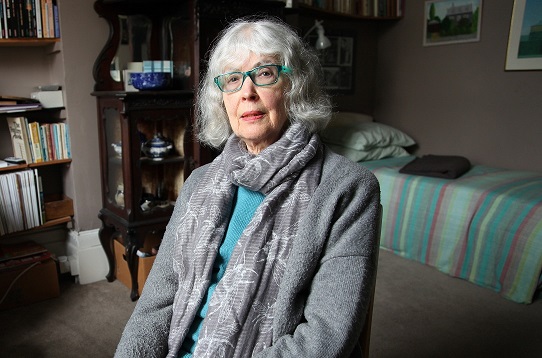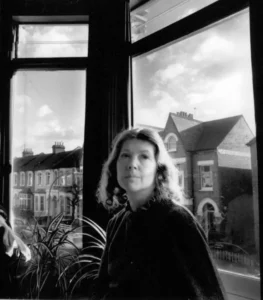
Photo credit: Jemimah Kuhfeld.
Fleur Adcock: 1934 – 2024
From Sarah Quigley:
The poet Fleur Adcock, who died in October at the age of ninety, leaves a remarkable body of work that spans more than five decades. Delicate yet dark, tender yet wry, laidback and conversational yet sharply observational: the balancing of opposites in her poetry symbolises all she was as an artist. Fleur’s multilayered poems won her high acclaim not only in her birth country New Zealand but also in England, where she lived for most of her adult life. She was noted for her work translating medieval Latin and contemporary Romanian poetry, and edited several significant works, including The Oxford Book of Contemporary New Zealand Poetry (1982) and, with Jacqueline Simms, The Oxford Book of Creatures (1995).
Fleur was born in 1934 in Papakura to English parents: Cyril Adcock, a teacher, and Irene (nee Robinson), a music teacher and writer. When Fleur was five and her sister Marilyn (later Marilyn Duckworth, the acclaimed novelist) was four, the family relocated to London so Cyril could study at Birkbeck College. The outbreak of war meant that Fleur and Marilyn were evacuated to the countryside and moved multiple times, which may account for the unsentimental resilience that was ever-present in Fleur’s personality and her writing.
After moving back to New Zealand and studying classics at Wellington Girls’ College and Victoria University of Wellington, at the age of eighteen Fleur married the poet Alistair Te Ariki Campbell, who was also educated in classics and was a member of the informal ‘Wellington Group’, along with James K. Baxter, Peter Bland and others. Fleur and Alistair had two sons, Gregory and Andrew, before divorcing in 1958. Four years later, Fleur married the already well-known comedic writer Barry Crump. The marriage lasted only five months, whereupon Fleur left for England. It seems to have been a homecoming of sorts, as she remained there for the rest of her life, although visiting New Zealand regularly. The dislocations of emigration – in both directions – permeate many of her poems: there is often a deep unease underlying seemingly calm domestic settings, and an intense examination of the relationship between personal identity and place. Fleur’s first collection of poetry, The Eye of the Hurricane (1964), was mostly written before she left for London, but many of its poems have no specific setting, suggesting an ambivalence towards the landscapes of New Zealand.
Often in her poetry Fleur drew on memories of her English childhood, recreating vivid scenes in her inimitable, intimate voice:
And what was the happiest day I remember?
It was when we went to the Mill Stream –
my sister and I and the Morris kids.
We wore our bathing-suits under our dresses
(subterfuge), crossed the live railway lines
(forbidden), and tramped through bluebell woods.
Her second collection, Tigers, was published by Oxford University Press in 1967 and marked the start of an illustrious and prolific writing career that resulted in more than twenty books. Fleur won numerous awards, including the 1977/78 Arts Council creative writing fellowship in Ambleside in the Lake District (a landscape she fell in love with). She also worked as a poetry commentor for the BBC. In 1979, she resigned from her job as a librarian at the Foreign and Commonwealth Office, took up the Northern Arts Literary Fellowship at the Universities of Newcastle upon Tyne and Durham – followed by a long line of distinguished writers including Jo Shapcott, Barry Unsworth, and Jackie Kay – and began focusing fulltime on her writing. Other prestigious awards followed, including an OBE (1996), a Queen’s Gold Medal for Poetry (2006), and the Companion of the New Zealand Order of Merit for services to literature (2008).
It can be difficult for New Zealand-born writers living away to avoid the tag of ‘writer in exile’, but Adcock always transcended national pigeonholing. Like Katherine Mansfield, she developed both an intense attachment to, and a sharp-eyed detachment from, the country of her birth. One gets the sense that it took Fleur many years to know how to – or to want to – tackle that topic. She claimed that she could ‘never write’ when she was in New Zealand, but by 2014, she was ready to base an entire collection around her New Zealand ancestry. The Land Ballot is a poetic sequence recounting the story of her grandparents, immigrants from Manchester, who won a hundred and fifty acres of ‘unbroached bush’ at Te Rauamoa. In a compelling mix of fact – ‘things turn folkloric if you wait too long’ – and conjecture, Fleur recreated one of the most fascinating and strange periods of colonial history: small isolated communities establishing determined pockets of Europeanness in an alien environment. The historic could equally be read as the personal – a parallel to the way she and her New Zealand contemporaries felt in the 1950s and ’60s, looking towards Europe for subject matter and form, all the while searching for ways to interpret where they were actually living.
Just as themes of cultural identity and displacement recur throughout Fleur’s oeuvre, so do the preoccupations central to ‘humanness’: love, sex, ambition, illness, cruelty, kindness. Who can forget the lines from ‘For a Five-Year-Old’, in which the poet helps her son rescue a snail:
… your gentleness is moulded still by words
from me, who have trapped mice and shot wild birds,
from me, who drowned your kittens, who betrayed
your closest relatives and who purveyed
the harshest kind of truth to many another.
But that is how things are: I am your mother,
and we are kind to snails.
This is pure Adcock: unsentimentality yoked with deep emotion; the seemingly casual tone countered by finely wrought rhyme and form – and the searingly understated denouement, which has the finality and force of a blow or a kiss. This is surely what Carol Ann Duffy referred to when she described Fleur’s talent as being like ‘a razor blade in a peach’.
Fleur’s friend C. K. Stead, in his exquisite poem ‘An Horatian ode to Fleur Adcock at eighty’, described her as ‘that princess of quiet fire / from a southern city’, who collected lovers – ‘too many to remember’ – and then turned her back on it all in favour of ‘her family’s fables / and deftest celebrations / of the life of things / with feelers and wings’. It was, in fact, in her eightieth year that I visited Fleur in her North London house, and I witnessed these celebrations of nature and domestic life firsthand. She welcomed me into her characterful old house, where we drank tea in the kitchen and chatted about New Zealand poetry, mutual acquaintances, writing – and not writing. In the decade from 2000 to 2010 Fleur had published nothing, but now she was writing again at full strength, with no diminishment in her energy, empathy, and wit.
Later in the afternoon, we wandered in the nearby woods. Fleur stopped frequently, stooping to examine minute plants half submerged in leaves, or gazing through the latticework of branches to point out cloud formations that towered and then toppled. For someone like me who’s always in a hurry, the crisp sunny afternoon felt miraculously sealed off from the bustle of ordinary life. Fleur had the ability to live completely in the moment. Yet far from losing herself in it, she actively engaged with it; absorbed it (nothing escaped her curious interest, from the pattern on a bone-china teacup to the blazing grandeur of an English oak); and then, in a kind of poetic alchemy, transformed it with a sleight-of-hand casualness that never eschewed elegance.
Fleur continued to write into her eighties. In 2019, she marked her eighty-fifth birthday with the publication of her substantial Collected Poems: she had become ‘embarrassingly prolific’, as she quipped in an interview with RNZ’s Kim Hill. On 10 February 2024, on the occasion of her ninetieth birthday, Te Herenga Waka University Press simultaneously with Bloodaxe Books in the UK published an expanded version that included twenty new poems. The poised, often ironic tone is as present as ever in the new work, as is Fleur’s deep, empathetic insight into the plight and privilege of being alive.
It’s hard to sum up a writer whose reputation is as large, whose oeuvre is as substantial, and whose creative talent is as magical as Fleur Adcock’s. Perhaps we need only look at her name for a summary of her talent, her last name bringing to mind the qualities of an adze: the hard integrity of stone, a clearcut vision slicing through layers of artifice to reach the heart of the matter. And then her first name: the delicacy of a flower, the lightness of touch that seems so natural one can only wonder: How did she do that? Now that she’s gone, we’re still entranced, still in awe, still wondering.
Fleur is survived by her sons Gregory and Andrew; six grandchildren, Oliver, Lilian, Julia, Ella, Cait and Rosa; seven great-grandchildren, Charlie, Ash, Seth, Alexandra, Jean, Ella and Mira Fleur; and her sister Marilyn.
Fleur Adcock, poet, born 10 February 1934; died 10 October 2024
Read Emma Neale‘s interview with Fleur Adcock here.
'Many of our best stories profit from a meeting of New Zealand and overseas influences' - Owen Marshall

